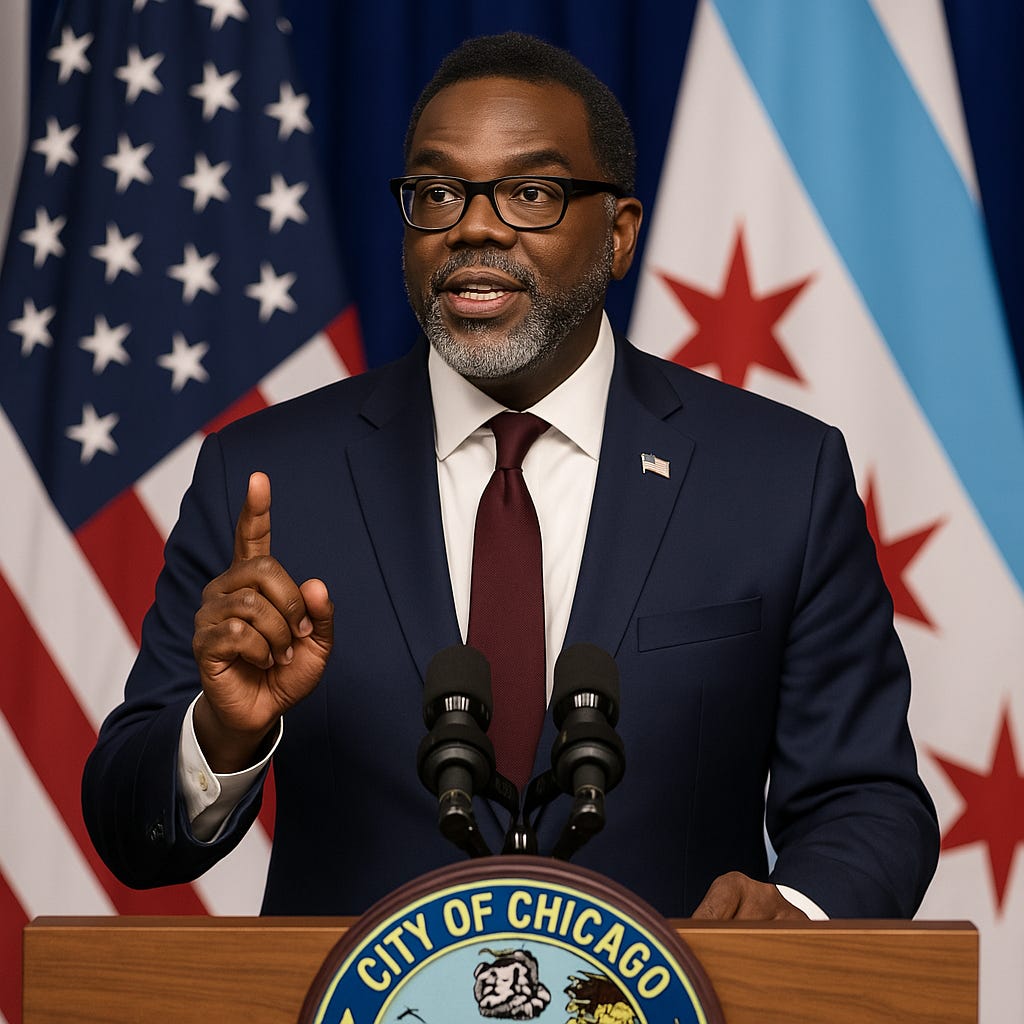Will this be another bloody holiday weekend in Chicago? Let's hope not.
Spinning urban crime stats isn't helping Chicago's mayor.

Just hours before bullets tore through River North, Chicago Mayor Brandon Johnson stood behind a podium, touting a historic drop in violent crime: homicides down 32.7%, shootings down 39.4%. The message was clear—Chicago was turning a corner.
And then came the bloodshed.
A mass shooting outside Artis Restaurant and Lounge left 4 dead and 14 more wounded, gutting not just windows and lives, but the city’s narrative. The target? An album release party for rapper Mello Buckzz. The aftermath? A visceral reminder that statistics don’t tell the whole story.
* * *
Last year, 109 Chicagoans were shot — 19 of them killed — over the July 4th weekend. This year, shootings and violent crime numbers are way down in cities across the country. However, the exact reasons are unclear.
Cities like New Orleans, Baltimore, and Philadelphia have seen 40%+ drops in homicides since early 2024. Chicago’s own decline—35% this year—has been linked to a patchwork of efforts, including midnight basketball, the Peacekeepers Program, state-funded violence interrupters, and community-led interventions.
President Trump is also taking credit, claiming it’s his mass roundups and detentions of immigrants that are driving crime numbers downward.
Yet even as Mayor Johnson leans into progressive rhetoric, his administration and the City Council are falling back on a familiar summer tactic: flooding high-crime neighborhoods with police and curfews on teenagers. This weekend’s surge concentrates officers in predominantly Black and Latino areas like Englewood and West Garfield Park—communities long subjected to over-policing and under-protection. It's a move billed as “visibility and deterrence,” but for many residents, it feels more like surveillance than safety.
In Chicago, concentrated poverty, easy access to firearms, and systemic disinvestment haven’t gone anywhere. The conditions that breed violence are still deeply entrenched.
Yes, the numbers are real. But so is the fear, anger, and mistrust. For residents, progress isn’t a percentage—it’s whether their kids make it home, whether the celebration doesn’t end in sirens.
* * *
And here’s the kicker: Mayor Johnson’s approval rating still sits at a staggering 6%, despite getting credit, deserved or not, for crime reduction. That’s not just low—it’s historic. Even among progressives who voted for him (like me), support has cratered.
Part of the problem is messaging failure. His progressive vision hasn’t translated into a compelling story reaching everyday Chicagoans.
This isn’t just about crime—it’s about credibility. When violence erupts hours after proclamations of peace, whether in Chicago or Gaza, it challenges not only policy but also leadership. And when approval ratings sink below snail poop, it’s not just a PR problem—it’s a crisis of connection.
The View From Right Field
Republican leaders, including Trump, have begun framing the national drop in violent crime as a vindication of their mass deportation agenda, including militarizing communities, despite the complete absence of clear causal evidence. Their big, ugly budget allocates $185 billion for ICE immigrant roundups and new privately-run detention centers.
The reality check:
The ICE raids in Los Angeles, launched in early June, have triggered widespread chaos, fear, and violent unrest. Families have been torn apart, with loved ones detained in basement processing centers under reportedly inhumane conditions—some so desperate they’ve resorted to drinking from toilets.
ICE data shows a growing number of arrests involve non-criminal immigrants, undermining the “worst of the worst” justification.
Criminologists consistently find no link between immigration and increased crime—in fact, immigrant-heavy communities often have lower crime rates.
Trump’s team is selling deportation as a public safety win, but the data tells a more complicated story. The drop in crime is real, but multiple factors, including post-pandemic stabilization, poverty-reduction strategies like guaranteed basic income, community violence intervention programs, and local policing reforms, are more likely to drive it.
COMING UP ON HITTING LEFT RADIO…

Coming Up on Hitting Left: Tune in Friday, July 11th, from 11 a.m. to noon CDT on WLPN 105.5 FM in Chicago, or streaming live worldwide at lumpenradio.com. I’ll be joined by investigative journalist Ray Long and political strategist Joanna Klonsky to unpack the myths, realities, and raw contradictions of Chicago Politics.
Join us.



